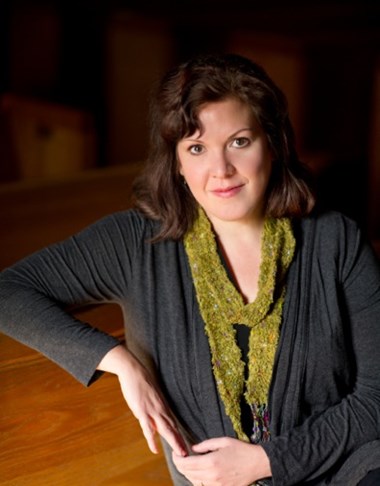
As I told my friend Jennifer Grant when I read the introduction to her newest book, Wholehearted Living: Five Minute Reflections for Modern Moms, "I'm ordering this book for all my mom friends this Christmas." Jen is the author of a number of books I've appreciated related to parenting (Love You More and Momumental), and I appreciate her wisdom as a mother with four kids who are all older than mine. All this is to say, I am so grateful that she agreed to contribute to the Small Talk series on this blog and offer some wisdom from the perspective of a mom with older kids.
As he was growing up, my eldest child seemed always to trust me. When I explained to this boy as a toddler that “we” don’t shove other children, chase balls into the street, or touch the stovetop, he regarded me with his big, hazel eyes, nodded, and refrained, from then on, from such misdemeanors.
His three younger siblings were more likely to be rankled by my admonitions, to push back, and—yes—to burn their fingers on hot light bulbs and burners and to upset freestanding displays at the grocery store. (“Clean up in aisle nine!”) But this one child was born with a posture of obedience and trust.
When all four of my children were little, their frequent questions about Christianity included everything from “Were dogs and cats on Noah’s ark?” to “Who did Adam and Eve’s sons marry?” In answer to these and other inquiries, I read them relevant parts of the Bible or answered, “What do you think?” My eldest child often nodded while the others erupted into a chorus of “But why?” “But how?” “That doesn’t make sense!”
Of course, their questions, over the years, got more complicated. “Why is there war?” and “How do I know that God is hearing my prayers?” and “How can God be everywhere at once?” replaced more whimsical ones about whether God sleeps or where, precisely, heaven is located.
Again, I did my best with these questions, acknowledging how tricky it can be (whether you are a child or an adult) to understand holy mysteries. Faith, I’d try to explain, is committing to believing in something you can’t see and don’t completely understand. I’d tell them about times when I felt God’s presence in my own life and the ways I saw God caring for, and working through, each of them.
Many times, spiritual questions were pitched at me while I was doing six other things at once—boiling water for macaroni and cheese, sliding papers into a backpack, letting the dog out, or helping one of the kids tie his shoes while overseeing another wash her hands.
As incomplete (or rushed or distracted) were my responses to my children’s questions, I rested in the knowledge that their faith journeys and relationships with God were not up to me; they were between them and God. I could do my best to “raise them up” the way I should and to keep them in communion with other believers at church, but ultimately, each of my children would have to connect and wrangle with God on their own.
A few weeks before he left for college, my eldest and I went out to dinner at a restaurant in New York City whose menu boasted delicacies such as “king trumpet mushrooms” and “monkfish with caramelized fennel.”
I was awash in nostalgia. This boy who had lived on grilled cheese sandwiches and macaroni and cheese for much of his preschool years now was happily feasting on charred Brussels sprouts and sprouted wheat berries. He was now, legally, an adult and was about to be launched into college life.
In what ways would he change or take on new identities—either temporarily or for good? How would our relationship change? Would he hold fast to his faith, or set it aside for a while—as I had done myself at a few points in my life?
It had been years since I was in the position to keep him from every injury or wrong turn. In adolescence, he no longer looked to me to answer all of his spiritual or intellectual questions. But he’d been present in our home, ever ready to talk about what was inspiring or troubling him. Soon he’d move out and much of his life would be invisible to me. It had come to be time for him to make his faith his very own.
We sat for hours outside on a sidewalk table, people-watching and talking about what was to come. It was one of those rare times when a voice inside me said, “Pay attention. This—this moment right now—is one you’ll always want to remember.” And so I did. That evening, our conversation looped around to his faith and to the questions that troubled him. Among others, we spent a long time talking about the problem of evil. How can we believe in a good God while living in a world so full of injustice and suffering? Why are some of us born into comfort while so many are born into abject poverty?
As he asked questions and expressed what tripped him up in his faith, I was able to listen and to share the ways I wrestle with similar issues. Ultimately, I knew I could no longer tell him what to think or what to do, regardless of how much he trust he places in me. Like it was when he was very young, my job was to listen to him, tell him about my own experiences of God’s presence, and let him continue on his own faith journey. And trust that God will never let him go.

Jennifer Grant is the author of four books: Love You More: The Divine Surprise of Adopting My Daughter, MOMumental: Adventures in the Messy Art of Raising a Family, Disquiet Time: Rants and Reflections on the Good Book by the Skeptical, the Faithful, and a Few Scoundrels, and Wholehearted Living: Five Minute Reflections for Modern Moms. Find her online at jennifergrant.com.
Support our work. Subscribe to CT and get one year free.
Recent Posts

Talking with Kids about the Problem of Evil
Talking with Kids about the Problem of Evil
Talking with Kids about the Problem of Evil
Talking with Kids about the Problem of Evil














